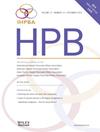胰腺切除术患者肠门静脉完全闭塞的血管重建技术
IF 2.7
3区 医学
Q2 GASTROENTEROLOGY & HEPATOLOGY
引用次数: 0
摘要
导言:胰腺病变导致肠门闭塞时,由于肠门高血压和侧支静脉引流,会使胰腺切除术复杂化。结果 在27例胰腺切除术中接受静脉血管再通的患者中,大多数(15例)是胰腺神经内分泌肿瘤患者。闭塞大多发生在脾门汇合处(15 例)。中位闭塞长度为 4.0 厘米 [3.1-5.8]。在血管再通策略方面,11 例患者采用了腔间孔分流术,3 例患者采用了颈内导管直通静脉血管再通术,9 例患者采用了传统的静脉切除和重建术,2 例患者采用了血栓切除术。队列手术时间和估计失血量的中位数分别为522分钟[433-638]和1000毫升[700-2500]。中位住院时间为 10 天 [8-14.5],再入院率为 37%。讨论尽管处理肠门闭塞的技术复杂,但早期血管再通策略(包括腔间分流或直通静脉血管再通)是可行的,并有助于手术条件合适的患者安全地进行胰腺切除术。本文章由计算机程序翻译,如有差异,请以英文原文为准。
Revascularization techniques for complete portomesenteric venous occlusion in patients undergoing pancreatic resection
Introduction
Pancreatic pathologies causing portomesenteric occlusion complicate extirpative pancreatic resection due to portomesenteric hypertension and collateral venous drainage.
Methods
Patients with portomesenteric occlusion undergoing pancreatectomy were identified between 2007 and 2020 at Stanford University Hospital. Demographic and clinical data, technique and perioperative factors, and post-operative outcomes were analyzed.
Results
Of twenty-seven (27) patients undergoing venous revascularization during pancreatectomy, most (15) were for pancreatic neuroendocrine tumor. Occlusions occurred mostly at the portosplenic confluence (15). Median occlusion length was 4.0 cm [3.1–5.8]. Regarding revascularization strategy, mesocaval shunting was used in 11 patients, in-line venous revascularization with internal jugular conduit in three patients, traditional venous resection and reconstruction in 9 patients, and thrombectomy in two patients. Median cohort operative time and estimated blood loss were 522 min [433–638] and 1000 mL [700–2500], respectively. Median length of stay was 10 days [8–14.5] with overall readmission rate of 37%. Significant complications occurred in 44% of patients despite only one (4%) perioperative mortality.
Discussion
Despite the technical complexity for managing portomesenteric occlusions, early revascularization strategies including mesocaval shunting or in-line venous revascularization are feasible and facilitate a safe pancreatic resection for surgically fit patients.
求助全文
通过发布文献求助,成功后即可免费获取论文全文。
去求助
来源期刊

Hpb
GASTROENTEROLOGY & HEPATOLOGY-SURGERY
CiteScore
5.60
自引率
3.40%
发文量
244
审稿时长
57 days
期刊介绍:
HPB is an international forum for clinical, scientific and educational communication.
Twelve issues a year bring the reader leading articles, expert reviews, original articles, images, editorials, and reader correspondence encompassing all aspects of benign and malignant hepatobiliary disease and its management. HPB features relevant aspects of clinical and translational research and practice.
Specific areas of interest include HPB diseases encountered globally by clinical practitioners in this specialist field of gastrointestinal surgery. The journal addresses the challenges faced in the management of cancer involving the liver, biliary system and pancreas. While surgical oncology represents a large part of HPB practice, submission of manuscripts relating to liver and pancreas transplantation, the treatment of benign conditions such as acute and chronic pancreatitis, and those relating to hepatobiliary infection and inflammation are also welcomed. There will be a focus on developing a multidisciplinary approach to diagnosis and treatment with endoscopic and laparoscopic approaches, radiological interventions and surgical techniques being strongly represented. HPB welcomes submission of manuscripts in all these areas and in scientific focused research that has clear clinical relevance to HPB surgical practice.
HPB aims to help its readers - surgeons, physicians, radiologists and basic scientists - to develop their knowledge and practice. HPB will be of interest to specialists involved in the management of hepatobiliary and pancreatic disease however will also inform those working in related fields.
Abstracted and Indexed in:
MEDLINE®
EMBASE
PubMed
Science Citation Index Expanded
Academic Search (EBSCO)
HPB is owned by the International Hepato-Pancreato-Biliary Association (IHPBA) and is also the official Journal of the American Hepato-Pancreato-Biliary Association (AHPBA), the Asian-Pacific Hepato Pancreatic Biliary Association (A-PHPBA) and the European-African Hepato-Pancreatic Biliary Association (E-AHPBA).
 求助内容:
求助内容: 应助结果提醒方式:
应助结果提醒方式:


